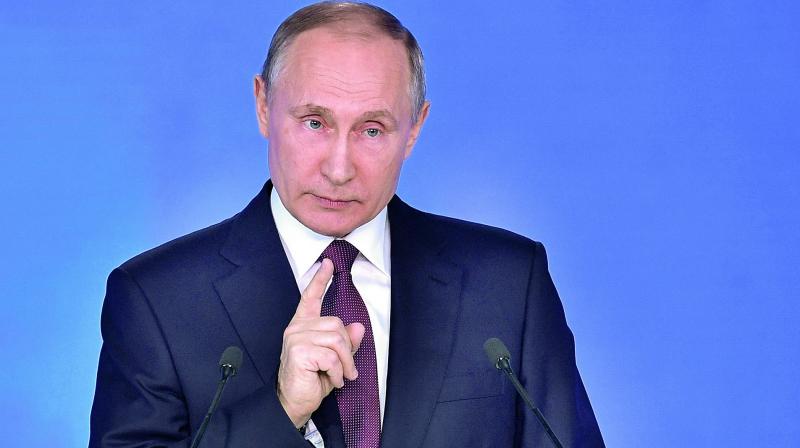Skripal nerve agent row: A counter-view

If one were to anchor a TV programme with the archival revelation that it was Benazir Bhutto who introduced Theresa May’s husband to the future British Prime Minister at an Oxford reunion ball in 1976, many of us would perhaps happily spend a lot of our precious time glued to the looped and re-looped discussion.
On the other hand, if one were to ask whether PM May posed a bigger threat to a stable world order than does President Donald Trump it would likely pass for a precipitous canard.
This despite that fact that we are ever so often cautioned about the rear view mirror in the car: the objects one sees may be closer at heel than they appear. The warning can be easily applied to international politics.
What we see, or believe we are seeing, can be different from what is afoot. What seems distant or remote could be the trigger for what passes for domestic turbulence. Astute social scientists call it dialectics, whereby everything in the world can be connected with everything else.
Take the poisoning of the double agent Sergei Skripal in Salisbury or consider the latest chemical attack near Damascus in the rebel-held region of Douma. There are legitimate ways of seeing a link between the two.
But the way the avenues of news and information have been dumbed down, it would be a challenge to engage an average citizen in a discussion on what to them would be a distant blip on their mirror.
It is a fact, after all, as distinct from false news, that Trump was elected US President in November 2016. Wasn’t he? Then his election was soon declared to be the handiwork of Russian agents. Right?
Indeed, Trump continued to annoy the deep state. He wanted to befriend Vladimir Putin and questioned the purpose of Nato.
He went a step further. He began to question intelligence reports passed to him or leaked to the public.
Then came Theresa May to the rescue of the deep state with its roots on both sides of the Atlantic. When Trump in his pre-political avatar was misbehaving with women, May was already her country’s home secretary. She held that position from 2010 until she was elevated to lead her party and country in July 2016.
Her tenure as home secretary saw the destruction of Libya and the savage assault on Syria. Even more importantly, she was in the cockpit when the Crimea crisis erupted. And she had a good view of it even if she may have been privately appalled at the less than robust response that Nato was willing to offer Russia.
When she became the first foreign leader to visit President Trump on January 26 last year, Ms May was nursing another headache on the tour. And so her round trip to the White House included an equally vital stopover in Turkey on the way back.
Leaders of both countries on her itinerary were allies of Nato and both were veering perilously close to Putin. In a jiffy, she saw the centuries-old British policy of garrotting Russia slipping under her feet.
The mirror on the driver’s side may be telling us to watch out for Trump, who everyone, including most Americans, agrees is speeding ahead rather recklessly on an uncharted trajectory. The mirror on the other side though is showing us a blip, and in a lane where it shouldn’t be. As far as the naked eye can see, the more threatening blip looks like May.
Double agent Sergei Skripal was swapped by Russia with the US in 2010 and sent for safekeeping to UK. There are some questions about his illness the Russians have asked, including the question: what purpose could it serve to bump off a used-up Russian double agent on the eve of a presidential election, or just ahead of the World Cup that Russia will be hosting?
There can be a legitimate suspicion that Skripal and, unwittingly, his daughter fell victim to a strike by someone whose cover Skripal had blown.
But we could also ask, on the other hand, whether it is impossible for another country to replicate the poison that one country has manufactured. The question holds the key when the other side claims to know what that poison is.
A poor scientist died of smallpox in England, after all, when a laboratory accidently released the virus in 1978. The cause of Janet Parker’s infection sent shockwaves through the medical profession.
It was reportedly accepted at the time that the virus had travelled through an air duct connecting a smallpox lab with Janet’s office directly above.
To assert that both attacks — in Salisbury and in Douma — can be blamed on Russia, is to state the obvious. A more involved discussion could look at the rise of John Bolton as the new national security adviser to Trump.
He has advocated war with the Iran, and the alleged Syrian chemical attack may tie up with that objective, as a ruse.
But why has Trump changed his tune on Russia? Has the deep state got the goods on him, in a manner of speaking? If so, May should have a better grip on the narrative. It was a former British agent in Moscow, after all, whose report is said to have brought the President of the United States to his senses, if that is the word.
By arrangement with Dawn

